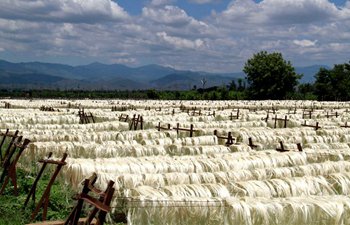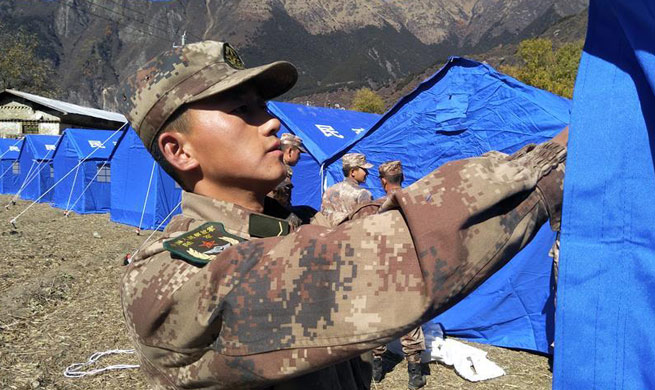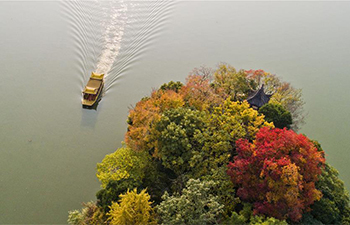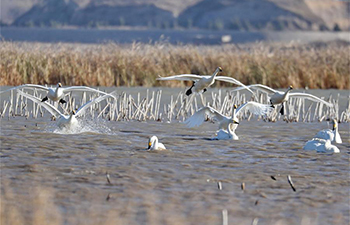By Peter Mertz
DENVER, the United States, Nov. 18 (Xinhua) -- American Big Oil was quick to water down the impact of one of the biggest inland oil spills in U.S. history, but environmental groups jumped on the ecological disaster with a frenzy.
TransCanada said in a news release Friday that it had scrambled more than 75 people to the site of a 210,000-gallon (795,000-liter) pipeline leak in a rural area of South Dakota the day before and crews were working "around the clock" to clean up the mess.
"The oil industry has a massive history of leaks and safety problems," said Marcie Keever, Legal Director of Friends of the Earth (FOE).
"It's clear that oil companies value profits over safety or protecting the environment," Keever told Xinhua Friday. "It's always been profits over people for them."
Oil companies are traditionally some of the wealthiest businesses in America with Exxon Mobile ranking as the country's second largest corporation behind Wal-Mart with 2016 revenues of 197 billion U.S. dollars, according to Fortune 500.
FOE is a global environmental protection organization founded in 1969 with affiliates in 75 countries that boasts having 5,000 local activist groups.
Environmentalists met Thursday's announcement from TransCanada -that it had shut down its six-year-old Keystone line due to a huge underground leak in South Dakota - with dismay and disbelief.
"It is time to say no to outdated fossil fuel infrastructure and invest in clean energy instead," Greenpeace's Rachel Rye Butler said in a statement Friday.
"Pipelines threaten human rights, put our climate at risk, and pose already realized risks to drinking water and the environment," she added.
The worst oil pipeline rupture in U.S. history occurred in 2016 after 1.2 million gallons (4.5 million liters) gushed into Michigan's Kalamazoo River, resulting in penalties of 61 million U.S. dollars to Canada's Enbridge Energy Partners.
Calgary-based TransCanada is the biggest supplier of gas and oil pipelines in North America with oil pipes totaling 3,460 kilometers and gas lines stretching almost 70,000 kilometers across the continent.
"We've always said it's not a question of whether a pipeline will spill, but when, and today TransCanada is making our case for us," Sierra Club's Kelly Martin said in a statement Friday.
TransCanada, founded in 1951 with annual revenues of 10 billion U.S. dollars, said Thursday the leak was the first detected on the pipeline since operation began in 2010.
That claim was refuted immediately by Sierra Club which reposted a 2011 article on its website Friday.
"The pipeline had a dozen spills in its first year of operation alone," Sierra spokesperson Gabby Brown noted.
The TransCanada Keystone Pipeline System was commissioned in 2010 and delivers 1.4 million barrels a day through 3-foot pipes from the Western Canadian Sedimentary Basin in Alberta to refineries in Illinois and Texas.
The tar sands Canadian crude oil is considered by industry experts to have high pollutant content and is especially damaging to the environment.
Former NASA Goddard Institute for Space Studies James Hansen said in 2010 that exporting oil from the Albertan tar sands would mean "game over for the climate."
TransCanada made national headlines in 2012 after seizing the land of American property owners in Texas through a legal process known as "eminent domain" to complete the Keystone system - that caused national outrage and support from Hollywood actors.
The company's ambitious, proposed "Keystone XL" line would run 2,164 kilometer from Canada though the western states of Montana, South Dakota, and Nebraska, and was met with stiff resistance and rejected in 2015 by then President Barack Obama.
But in January of this year, President Donald Trump signed a presidential memorandum to permit the pipeline's completion.
Ironically, the spill occurred on the eve of a vote next week by Nebraska commissioners to allow the Keystone XL extension through their state.
"This spill puts an exclamation point on the need to reject Keystone XL, but it doesn't tell us anything we didn't already know about pipelines," environmental group "350.org" posted Friday.
"That the Nebraska commissioners won't consider safety in their decision on Keystone XL should alarm everyone," 350's Sara Shor said.
Other U.S. environmental groups jumped on the oil spill as proof of the extreme dangers and environmental risks posed by continued fossil fuel production.
"This week's disastrous spill from the existing Keystone pipeline illustrates the risks of transporting oil," One Planet Strategies founder Janet Larsen said.
"There is no such thing as a guaranteed leak-proof pipeline," Larsen told Xinhua.
"The Keystone pipeline represents a serious environmental liability with negligible economic benefits," especially with the United States now exporting oil, she said. "Canadian tar sands oil is not needed."
In its defense, TransCanada was quick to say it had shut down the leak 15-minutes after being detected.
"Fifteen minutes is too long - any time is an environmental tragedy and damaging for decades or even longer," Keever countered.
The radical environmental group Earth First went so far as to advocate illegal action against TransCanada.
"The Keystone spill is just one more example of why direct action against pipelines is justified," Earth First organizer Panagioti Tsolkas told Xinhua.
"Its a reminder that the pipeline companies are the real terrorists and the people who blockade or sabotage their construction are the heroes," Tsolkas said.

















